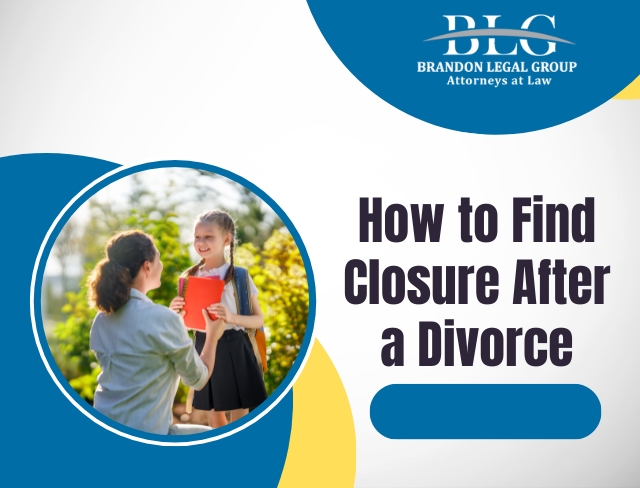How to Find Closure After a Divorce
The finalization of divorce papers often leaves an echoing silence. Where does one go from here? How can you move on and find that elusive sense of closure after such a life-altering event?
Understanding the Need for Closure
After the end of a marriage, many individuals find themselves adrift, unsure of how to pick up the pieces. Closure, in the realm of relationships, refers to a feeling of resolution or conclusion at the end of an event. Achieving this sense of finality is crucial for numerous reasons, such as personal growth, mental well-being, and setting the foundation for healthier future relationships.
Embracing Self-Care and Personal Growth
Amidst the emotional turmoil of a divorce, it’s vital to remember the importance of self-care. Taking time for oneself isn’t an act of selfishness; rather, it’s a crucial step in the healing process.
Physical Well-being
Engaging in physical activities like yoga, walking, or joining a gym can be therapeutic. Not only does it offer an opportunity to release pent-up emotions, but it also promotes overall health and reduces stress.
Mental Health and Mindfulness
Mindfulness practices, meditation, and even simple breathing exercises can work wonders for mental peace. It helps stay grounded and fosters a sense of control amidst the chaos.
Reconnecting with Hobbies and Passions
Rediscovering old hobbies or cultivating new interests can serve as a refreshing distraction. It provides an avenue to channel energy positively, allowing individuals to rebuild their identity outside the confines of the relationship.
Setting Personal Boundaries
It’s okay to seek solitude or decline invitations if one isn’t mentally ready. Setting boundaries ensures emotional safety and prevents feeling overwhelmed.
The following is a DRAMATIZATION AND IS NOT AN ACTUAL EVENT: For instance, after her divorce, Emily found solace in painting, an interest she had abandoned years ago due to her marital responsibilities. As she began to paint again, not only did she find an emotional outlet, but she also regained confidence and a sense of self-worth, vital for her healing journey.
Steps to Achieve Closure
Acceptance
The initial step towards healing is to recognize and accept the relationship’s end. This means facing the pain, understanding what led to the breakup, and acknowledging that the chapter has concluded.
Seeking Professional Help
Engaging with therapists or counselors can be immensely beneficial. They provide a safe space to express feelings, navigate grief, and set a path for recovery. Concurrently, a reliable legal advisor can help clear any lingering doubts or conflicts, ensuring no unresolved ties remain.
Setting New Goals and Priorities
Divorce offers a chance for self-reinvention. Whether it’s pursuing a forgotten passion, traveling, or even advancing your career, setting fresh goals can redirect focus and foster positivity.
Rebuilding Social Connections
Leaning on friends, and family, or even joining support groups can provide comfort. Surrounding oneself with a supportive network helps alleviate feelings of loneliness and can accelerate the healing process.
Reflect without Ruminating
While it’s essential to learn from past relationships, dwelling excessively can be detrimental. It’s vital to strike a balance, taking lessons forward without letting past mistakes overshadow future possibilities.
Role of a Divorce Attorney in Achieving Closure
Finalizing Legal Matters
Emotional healing is often intertwined with resolving lingering legal concerns. Addressing and finalizing any pending matters can significantly aid in the closure process, allowing one to move forward without apprehension.
Providing Objective Guidance
Divorce attorneys can provide neutral, objective advice, ensuring that decisions are made in the client’s best interest. Their expertise can navigate the legal maze, providing clarity and peace of mind.
The following is a DRAMATIZATION AND IS NOT AN ACTUAL EVENT: Consider the story of Jane, who felt overwhelmed with the legal intricacies post-divorce. By engaging with a skilled attorney, she efficiently resolved all matters, from property settlements to custody agreements. This legal support paved her way towards emotional closure, allowing her to begin a new life chapter with confidence.
Taking the First Step Towards Closure
Finding closure post-divorce might seem daunting, but with the right support, it is entirely attainable. Addressing both emotional and legal aspects is crucial. By proactively taking steps towards healing and seeking expert guidance, you can successfully navigate this transition, emerging stronger and more self-aware.
FAQs:
- Why is closure important after a divorce?
Closure provides emotional healing, enabling individuals to move forward without baggage and setting the foundation for healthier future relationships. - How can therapy help in finding closure?
Therapists offer a safe space to express emotions, navigate through grief, and set a recovery path. - What legal matters might need resolving even after a divorce is finalized?
Issues like property settlements, spousal support, or custody agreements might still need attention. - How can a divorce attorney assist in the closure process?
They provide objective advice and ensure that all legal ties are resolved, promoting emotional healing.
Conclusion
Divorce is undeniably challenging, but it’s also an opportunity for renewal and growth. Finding closure sets the foundation for a brighter, more fulfilling future. If you’re navigating the tumultuous waters of post-divorce emotions and legalities, remember you’re not alone. Don’t hesitate to seek guidance – reach out to our legal office today and take the first step towards a new beginning.
